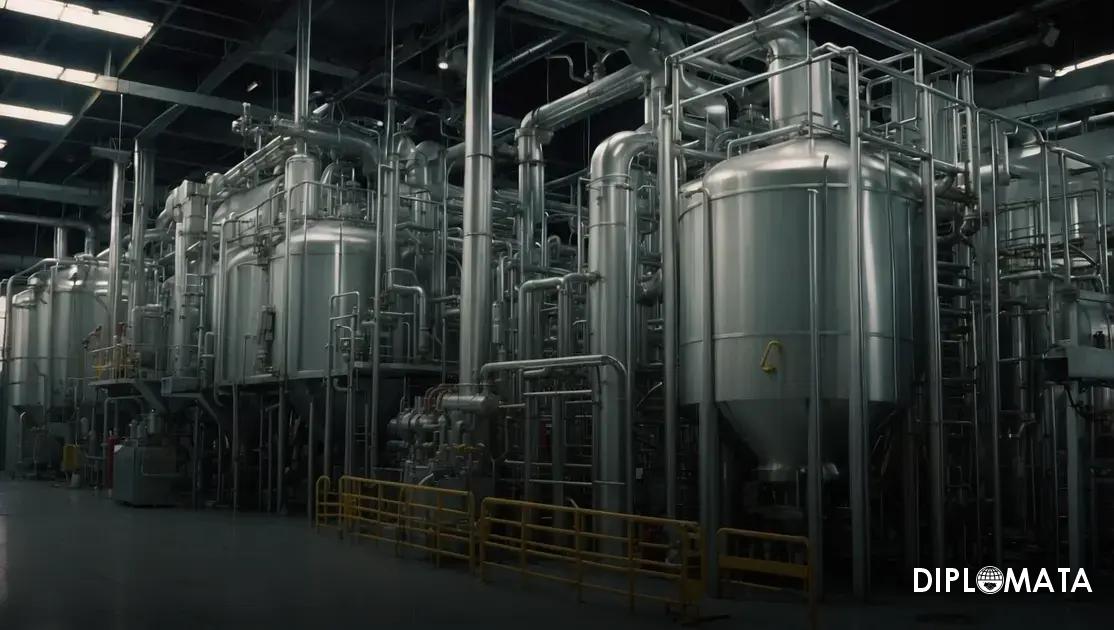What standards govern quality in the chemical industry? These standards ensure safety, efficiency, and environmental responsibility in chemical production.
What standards govern quality in the chemical industry? This question is crucial for companies seeking reliable AMINAS suppliers. In this post, you will discover the key standards that ensure quality and safety in the chemical sector.
Understanding these standards can help you make informed decisions when selecting suppliers and ensure compliance with regulations.
Stay with us to learn about the various quality benchmarks and how they impact your business’s success and reputation in the market.

In an era where quality defines market success, understanding the standards governing quality in the chemical industry is not just beneficial—it’s essential. As global demand for chemical products increases, so does the need for stringent quality assurance protocols. This article will delve into the key standards that shape quality control in the chemical sector, providing you with a comprehensive understanding to navigate this complex landscape.
Understanding Key Concepts in Chemical Quality Standards
The chemical industry is a vast ecosystem, governed by various quality standards that ensure safety, reliability, and compliance. Quality standards in this sector are frameworks established to maintain product integrity and consistency. Some of the most recognized standards include:
- ISO 9001: This standard focuses on quality management systems and is applicable across industries, including chemicals.
- REACH: A European Union regulation that addresses the production and use of chemical substances, aiming to protect human health and the environment.
- ASTM International: Known for developing voluntary consensus standards for materials, products, systems, and services in various industries, including chemicals.
Understanding these frameworks is crucial for companies seeking to establish a robust quality management system.
The Importance of Quality Standards in the Chemical Sector
Adhering to quality standards in the chemical industry offers numerous benefits:
- Enhancing Product Reliability: Regular adherence to quality standards ensures that products meet specific criteria, enhancing their reliability and performance.
- Ensuring Safety: Quality standards help mitigate risks associated with chemical products, protecting both consumers and the environment.
- Improving Customer Satisfaction: Consistent quality leads to higher customer satisfaction, which is essential for retention and brand loyalty.
- Gaining Competitive Advantage: Companies that prioritize quality can differentiate themselves in the marketplace, attracting more clients and fostering trust.
Criteria for Selecting and Evaluating Quality Standards
When selecting quality standards, organizations should consider several criteria to ensure alignment with their goals:
- Compliance Requirements: Understand the regulatory frameworks applicable to your operations and ensure chosen standards comply.
- Industry Reputation: Opt for standards recognized in the industry to enhance credibility.
- Alignment with Business Objectives: Choose standards that resonate with your company’s mission and vision, facilitating smoother implementation.
Step-by-Step Process to Implement Quality Standards
Implementing quality standards effectively involves a systematic approach:
- Initial Assessment: Evaluate current practices and identify gaps in compliance.
- Planning: Develop a roadmap for achieving compliance with selected standards.
- Training: Equip your team with the necessary knowledge and skills.
- Execution: Implement the standards across relevant processes.
- Monitoring: Regularly review and assess compliance to ensure ongoing adherence.
Advanced Tips and Best Practices for Quality Assurance
To maintain high-quality standards, consider these advanced strategies:
- Innovative Quality Control Techniques: Explore technologies such as AI and machine learning for predictive quality control.
- Leverage Technology: Implement software solutions for real-time monitoring of quality metrics.
- Continuous Improvement Methodologies: Adopt frameworks like Six Sigma or Kaizen to foster a culture of ongoing enhancement.
Common Mistakes in Quality Management and How to Avoid Them
Many organizations encounter pitfalls when implementing quality standards. Here are common mistakes and how to sidestep them:
- Lack of Commitment: Ensure leadership demonstrates commitment to quality initiatives.
- Inadequate Training: Provide comprehensive training to all employees involved in quality processes.
- Poor Communication: Facilitate open communication channels for discussing quality concerns and improvements.
By recognizing and addressing these mistakes, organizations can enhance their quality management processes and achieve better outcomes.
Conclusion
Quality standards in the chemical industry are not merely regulatory requirements; they are foundational to building trust and ensuring safety in product offerings. By understanding, implementing, and continuously improving quality standards, organizations can secure their position in a competitive market. To thrive in the evolving landscape of the chemical sector, prioritize quality as a core business strategy.
Our Expertise in Chemical Standards
With profound expertise in the chemical market, our company has been a reliable player for over 20 years. As specialists in Glycerin manufacturing, with our own factory and a renowned supplier reputation, we are well-positioned as a trusted source regarding what standards govern quality in the chemical industry.
Our Location: Av. Ipanema N° 165 – Empresarial 18 do Forte, Barueri – SP. CEP: 06472-002
Frequently Asked Questions
What are the main quality standards in the chemical industry?
The main quality standards in the chemical industry include ISO 9001 for quality management systems, ISO 14001 for environmental management, and specific standards like REACH and GHS for safety and chemical regulation. These standards help ensure that products are safe, effective, and produced consistently.
How does ISO 9001 apply to chemical manufacturing?
ISO 9001 sets the criteria for a quality management system that enhances customer satisfaction by consistently providing products that meet regulatory and customer requirements. In chemical manufacturing, it ensures that processes are controlled, and quality is maintained throughout production.
What is the role of REACH in chemical quality standards?
REACH (Registration, Evaluation, Authorisation, and Restriction of Chemicals) is a European Union regulation that governs the production and use of chemical substances. It ensures that companies register chemicals, assess their risks, and communicate safety information, thus promoting higher quality and safety standards.
What is the significance of GHS in the chemical industry?
The Globally Harmonized System of Classification and Labelling of Chemicals (GHS) standardizes the classification and labeling of chemicals to ensure safety and protection of human health and the environment. It helps in communicating hazards effectively and promotes safer handling and use of chemicals.
How do companies ensure compliance with these quality standards?
Companies ensure compliance with quality standards through regular audits, employee training, and by implementing quality management systems. They also maintain documentation and records to demonstrate adherence, and engage in continuous improvement processes to enhance quality and safety.





